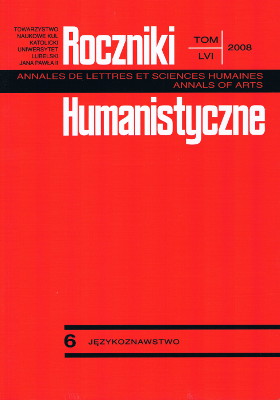Is There One Alternation ǫ : u in the Polish Language?
Abstract
The paper refers to a detailed study written by Franciszek Sławski Oboczność ǫ : u w językach słowiańskich [The Alternation ǫ : u in the Slavonic Languages]. It presents 56 such oppositions in Polish genders: nuda : nędza [bordem:misery], gruby : gręby [fat], pęknąć : wypukły [break : convex], klucz : klęczeć [key : kneel]. The Polish lexical material: appelative in the gender dubas ‘something hollowed out in an oak trunk’, which was obviously primarily ‘an old, rotten oak tree’, the toponymic type Dubas, Dubrawa // Dubrawa from the ethnic Polish territory, the anthroponymic type in the kind of Dubrawka // Dubrowka. Historically speaking, the primary names in the Polish documentation, later Dabrówka, the wife of Mieszko I, and other examples of toponyms of a lesser degree of reliability. The latter names were borrowed from the areas that were linguistically mixed in the kind of Dubaśno, Dubasiewszczyzna, Duble, Dubliny, Dubryk. This lexical material seems to show in the Polish territory yet one more such opposition – the elementary *dǫb-: * dub- and reach back to the Indo-European forms.
Copyright (c) 2008 Roczniki Humanistyczne

This work is licensed under a Creative Commons Attribution-NonCommercial-NoDerivatives 4.0 International License.





